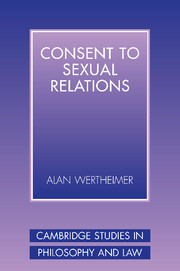Book contents
- Frontmatter
- Contents
- Preface
- Acknowledgments
- Abbreviations
- 1 Introduction
- 2 Law
- 3 The psychology of sex
- 4 The psychology of perpetrators
- 5 The harm and wrong of rape
- 6 The value of consent
- 7 The ontology of consent
- 8 Coercion
- 9 Deception
- 10 Competence
- 11 Intoxication
- 12 Sex and justice
- Appendix: Alphabetical list of hypothetical cases
- Index
Preface
Published online by Cambridge University Press: 04 March 2010
- Frontmatter
- Contents
- Preface
- Acknowledgments
- Abbreviations
- 1 Introduction
- 2 Law
- 3 The psychology of sex
- 4 The psychology of perpetrators
- 5 The harm and wrong of rape
- 6 The value of consent
- 7 The ontology of consent
- 8 Coercion
- 9 Deception
- 10 Competence
- 11 Intoxication
- 12 Sex and justice
- Appendix: Alphabetical list of hypothetical cases
- Index
Summary
Although this book ranges more widely, its central organizing question is this: when does a woman give valid consent to sexual relations? Put slightly differently, when does a woman's consent render it morally or legally permissible for a man to have sexual relations with her? Some very special cases aside, I take it to be uncontroversial that it is morally impermissible and should be legally impermissible to have sexual relations without consent. What should count as the sort of consent that is morally or legally transformative is a more complicated question. Or so I shall argue.
Most philosophical discussions of sexual consent have taken different tacks. Some have focused on the “ontology” of consent. They have asked whether consent is a state of mind or an action. And, if consent is an action, they ask whether consent must be explicit or verbal, or whether tacit or nonverbal signals are sufficient. Many other discussions have been prompted by some infamous cases in which defendants claimed that they mistakenly believed that the woman consented. Were they guilty? Can there be rape without rapists? These are all interesting and important questions, but they are not the questions with which I shall be primarily concerned. Assuming that everyone knows what is happening, when should we regard a male's behavior as morally impermissible or as a legal offense?
- Type
- Chapter
- Information
- Consent to Sexual Relations , pp. xi - xiiPublisher: Cambridge University PressPrint publication year: 2003

